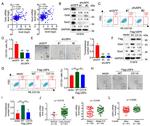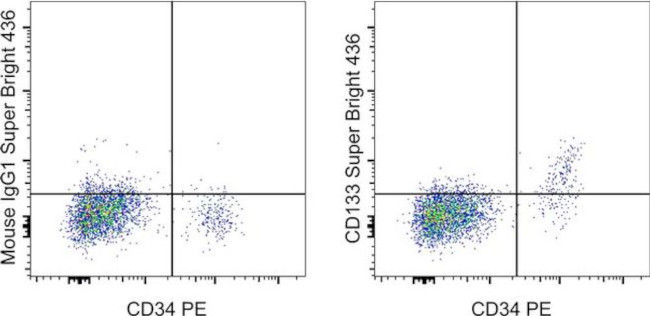Search Thermo Fisher Scientific
Invitrogen
CD133 (Prominin-1) Monoclonal Antibody (TMP4), Super Bright™ 436, eBioscience™
FIGURE: 1 / 5
CD133 (Prominin-1) Antibody (62-1338-42) in Flow





Product Details
62-1338-42
Species Reactivity
Published species
Host/Isotype
Recommended Isotype Control
Class
Type
Clone
Conjugate
Excitation/Emission Max
Form
Concentration
Purification
Storage buffer
Contains
Storage conditions
Shipping conditions
RRID
Product Specific Information
Description: The TMP4 monoclonal antibody reacts with human CD133 (Prominin-1), a 120 kDa member of the pentaspan family of proteins, which also includes Prominin-2. Their expression is found within plasma membrane protrusions such as epithelial microvilli. CD133 can exist in a number of alternatively spliced isoforms, and the protein has several N-linked glycosylation sites: the occurrence of both may be tissue-dependent. Human CD133 was first identified as an epitope expressed on CD34+ hematopoietic progenitors. Although the ligand and function of CD133 remain unknown, it has since proven to be very useful as a marker for both stem cells and cancer stem cells. In addition to its expression on hematopoietic precursors, CD133 has been used to identify tumorigenic colon cancer stem cells, brain cancer stem cells, prostate cancer stem cells, in addition to others.
The binding of the TMP4 antibody does not block the binding of another anti-human CD133 antibody, EMK08 (Product # 12-1339) indicating that they recognize distinct epitopes.
Applications Reported: This TMP4 antibody has been reported for use in flow cytometric analysis.
Applications Tested: This TMP4 antibody has been pre-diluted and tested by flow cytometric analysis of normal human peripheral blood cells. This may be used at 5 µL (0.25 µg) per test. A test is defined as the amount (µg) of antibody that will stain a cell sample in a final volume of 100 µL. Cell number should be determined empirically but can range from 10^5 to 10^8 cells/test.
Super Bright 436 can be excited with the violet laser line (405 nm) and emits at 436 nm. We recommend using a 450/50 bandpass filter, or equivalent. Please make sure that your instrument is capable of detecting this fluorochrome.
When using two or more Super Bright dye-conjugated antibodies in a staining panel, it is recommended to use Super Bright Complete Staining Buffer (Product # SB-4401) to minimize any non-specific polymer interactions. Please refer to the datasheet for Super Bright Staining Buffer for more information.
Excitation: 405 nm; Emission: 436 nm; Laser: Violet Laser
Super Bright Polymer Dyes are sold under license from Becton, Dickinson and Company.
Target Information
The CD133 (AC133) antigen is a 97 kDa glycoprotein, with 5 transmembrane domains, that shows up as a 120 kDa band on protein gels due to glycosylation. CD133 is a cell surface marker expressed by immature hematopoietic stem cells but not mature blood cells. In addition to hematopoietic stem and progenitor cells, CD133 has been found to be a marker for other stem and progenitor cells including neural and embryonic stem cells. CD133 has been shown to be expressed in cancers, including some leukemias and brain tumors, that may be derived from stem cells. Low level expression could also be detected in the kidney, pancreas, placenta, and fetal liver. Mutations in this gene have been shown to result in retinitis pigmentosa and Stargardt disease. Expression of the CD133 gene is also associated with several types of cancer. CD133 is expressed from at least five alternative promoters that are expressed in a tissue-dependent manner, and multiple transcript variants encoding different isoforms have been found.
For Research Use Only. Not for use in diagnostic procedures. Not for resale without express authorization.
How to use the Panel Builder
Watch the video to learn how to use the Invitrogen Flow Cytometry Panel Builder to build your next flow cytometry panel in 5 easy steps.
Bioinformatics
Protein Aliases: Antigen AC133; antigen CD133; CD133; hematopoietic stem cell antigen; hProminin; Lamp II; Lamp-2a; Lamp-2b; Lamp-2c; Lamp2; Mac3; Prominin-1; Prominin-like protein 1; Prominin1
Gene Aliases: AC133; CD133; CORD12; MCDR2; MSTP061; PROM1; PROML1; RP41; STGD4
UniProt ID: (Human) Q6SV49
Entrez Gene ID: (Human) 8842

Performance Guarantee
If an Invitrogen™ antibody doesn't perform as described on our website or datasheet,we'll replace the product at no cost to you, or provide you with a credit for a future purchase.*
Learn more
We're here to help
Get expert recommendations for common problems or connect directly with an on staff expert for technical assistance related to applications, equipment and general product use.
Contact tech support

